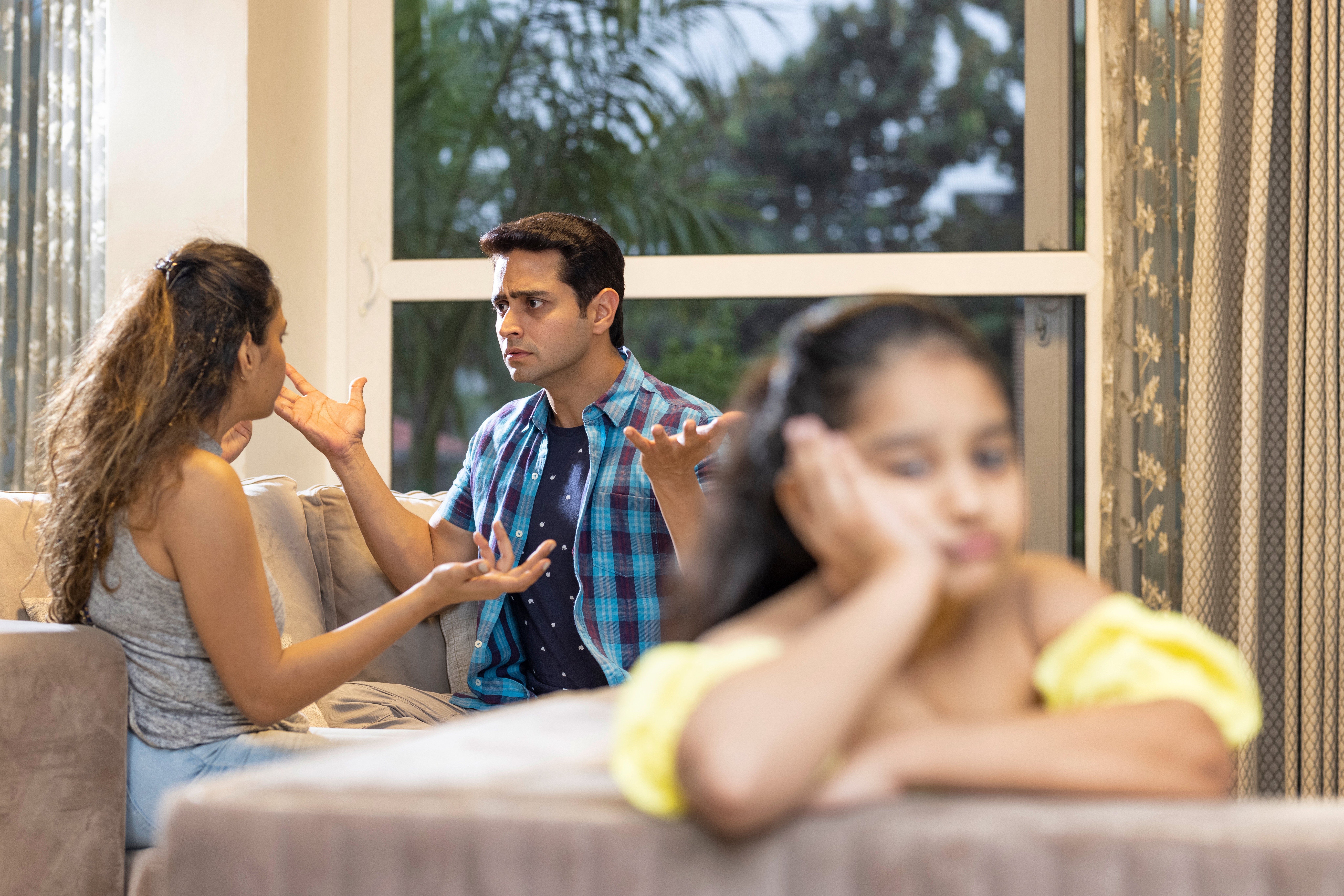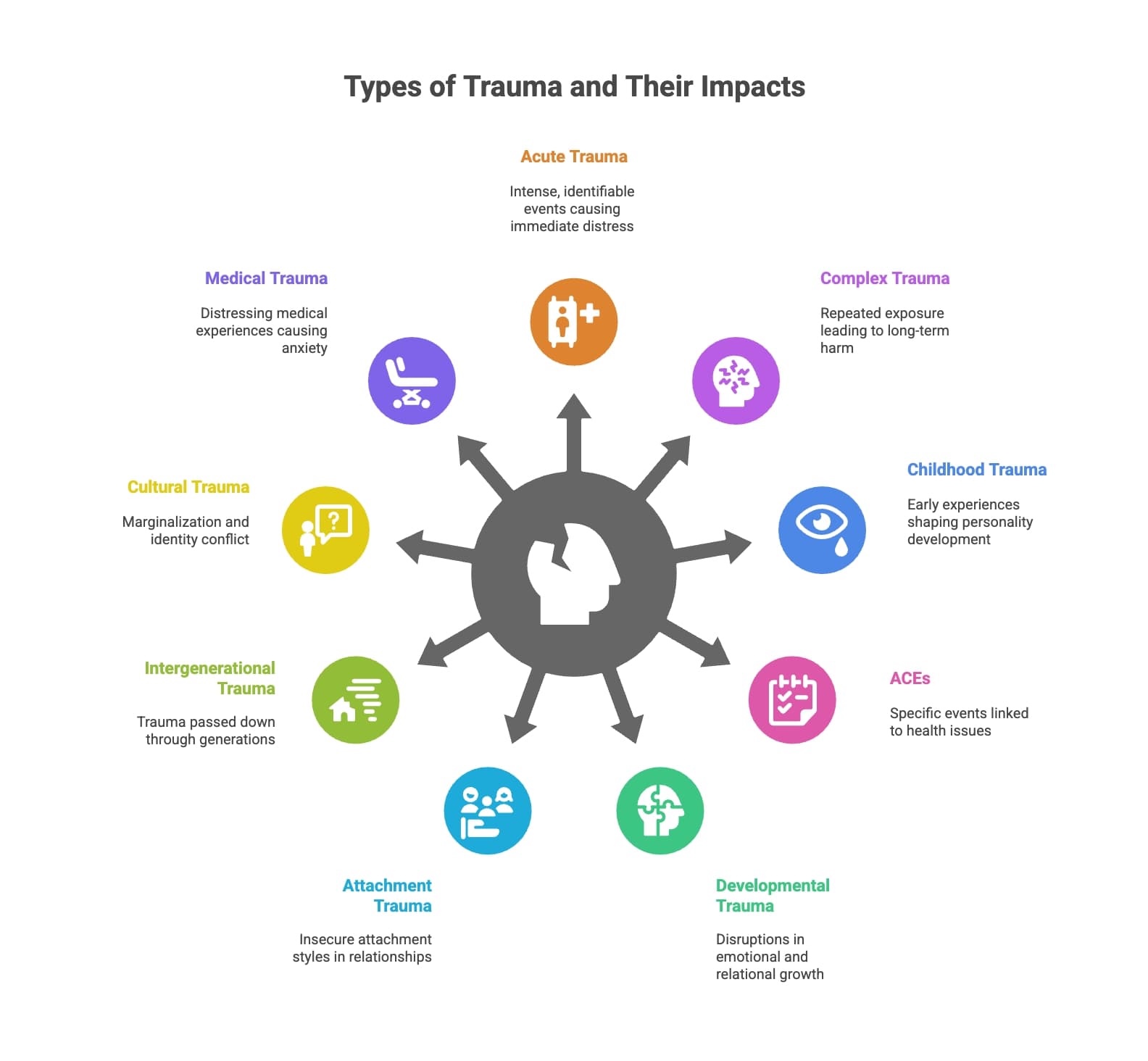
Amaha / / / Understanding Different Types of Trauma: A Journey Through Mental Wounds and Healing
ARTICLE | 6 MINS READ
Understanding Different Types of Trauma: A Journey Through Mental Wounds and Healing
Published on
9th Jul 2025

Dr Anuradha Kabra
MD Psychiatry

Nearly 70% of adults in India have experienced at least one traumatic event in their lifetime? In a country where mental health conversations are still whispered behind closed doors, understanding trauma becomes even more crucial.
"Trauma isn't what happens to you, it's what happens inside you as a result of what happened to you," says Dr. Khushboo Kansal, a leading psychiatrist at Amaha, Delhi. This perspective shifts our understanding from external events to internal responses.
What Exactly Is Trauma?
Trauma is like an event that shakes the very foundation of how we see ourselves and the world. It's not just about big, dramatic events - sometimes the smallest things can leave the deepest scars.
If our mind was a smartphone, trauma would be like a virus that corrupts the operating system. Everything still works, but not quite the same way.
When I was growing up in a middle-class family, I witnessed my neighbour's violent arguments almost daily. I didn't realize how those shouting would affect my own ability to handle conflict later in life.

Are you tired of your past baggage and trauma affecting you?
Discuss the details with our Care Team who can guide you to get Rid of your Past Baggage
The Science Behind Trauma: How Our Brain Responds
When something traumatic happens, our brain goes into survival mode. The amygdala - our brain's alarm system - starts screaming "DANGER!" while the prefrontal cortex, responsible for rational thinking, basically goes offline. Research shows that trauma literally changes brain structure. The hippocampus, which processes memories, can actually shrink. Meanwhile, stress hormones flood our system, your brain essentially rewires itself to prioritise survival over everything else.
Types of Trauma: The Many Faces of Emotional Wounds
1. Acute Trauma
A single, overwhelming event - maybe a car accident or witnessing violence during communal riots. It's intense, immediate, and leaves you reeling. The thing about acute trauma is that it's often easier to identify because there's a clear "before" and "after." You can point to that specific moment when everything changed.
2. Complex Trauma
Repeated exposure to traumatic events, often during childhood. Think of a child growing up in an abusive household in a small town where nobody talks about such things. Complex trauma is particularly common in Indian households where emotional abuse might be normalised as "strict parenting." A friend from Chennai once described how her father's daily criticism about her academic performance left her feeling worthless well into her thirties.
3. Childhood Trauma
This deserves special attention because our childhood experiences shape us more than we'd like to admit. In Indian families, we often brush off emotional neglect as "building character" or physical punishment as "discipline."
Adverse Childhood Experiences (ACEs)
ACEs are specific traumatic events during childhood that significantly impact adult health. These include physical abuse, emotional abuse, sexual abuse, physical neglect, emotional neglect, household dysfunction like domestic violence, substance abuse in the family, mental illness in household members, parental separation or divorce, and having an incarcerated family member. Research shows that higher ACE scores correlate with increased risks of mental health issues, chronic diseases, and early death.
Common types include:
- Physical abuse (the belt, the wooden ruler we all remember)
- Emotional neglect (being ignored when seeking comfort)
- Sexual abuse (a topic still heavily stigmatized in our society)
- Witnessing domestic violence
- Poverty and neglect
- Educational pressure and academic trauma
A colleague once told me how her mother's constant criticism about her appearance led to decades of self-doubt. That's childhood trauma showing up in adult life. The scary part? Her mother probably thought she was being helpful.
4. Developmental Trauma
This happens during critical developmental periods. It's like building a house on shaky ground - everything built after becomes unstable. Children who experience this often struggle with trust, self-regulation, and relationships later in life.
Types of Psychological Trauma: Beyond the Obvious
1. Attachment Trauma
Ever wondered why some people can't seem to maintain healthy relationships? Often, it traces back to early attachment experiences. In families, where emotional expression isn't always encouraged, children might develop insecure attachment styles. You know that person who either clings too tightly or pushes everyone away? That's attachment trauma in real life.
2. Intergenerational Trauma
Trauma can pass from one generation to another. Your grandmother's experience during Partition might still be affecting your family dynamics today. It's like genetic memory, but for emotional wounds. I've seen families where nobody talks about what happened during major riots or community displacement events, but everyone carries this unnamed anxiety about safety and belonging. The trauma gets passed down through behavior patterns, parenting styles, and unspoken fears.
3. Cultural Trauma
Living in a diverse country like India, we often overlook how cultural identity conflicts can be traumatic. A friend from the Northeast shared how constant questions about her appearance and origins created lasting psychological impact. Religious trauma is another form that's rarely discussed. When spiritual beliefs become sources of fear rather than comfort, it can deeply affect one's sense of self and belonging.
4. Medical Trauma
Hospital visits, surgeries, or chronic illness can create lasting psychological wounds. In India, where medical care can sometimes be impersonal or overwhelming, patients often develop anxiety around healthcare settings.

Trauma Response Types: How We Cope
When faced with trauma people develop coping strategies on their own.
1. Fight Response: Becoming aggressive, argumentative, or controlling. This person might become the person who always argues or the colleague who challenges everything.
2. Flight Response: Avoiding, withdrawing, or constantly being busy. Think of someone who can't sit still or always finds excuses to leave uncomfortable situations.
3. Freeze Response: Feeling stuck, unable to act, or dissociating. This might look like someone who "zones out" during conflict or feels paralyzed when making decisions.
4. Fawn Response: People-pleasing, losing yourself to keep others happy. Most Indians are familiar with this - we're raised to be "good children" who don't cause trouble.
Many people cycle through different responses depending on the situation. You might freeze during family conflicts but fight at work.
Types of Trauma Disorders: Beyond PTSD
While PTSD gets most of the attention, trauma can manifest in various disorders: Acute Stress Disorder: Similar to PTSD but occurs immediately after trauma Complex PTSD: From prolonged, repeated trauma Dissociative Disorders: When the mind disconnects from reality as protection Adjustment Disorders: Difficulty coping with life changes Depression and Anxiety Disorders: Often co-occur with trauma
What Types of Trauma Can Cause PTSD?
Not all traumatic experiences lead to PTSD, but some are more likely to:
- Combat exposure
- Sexual violence
- Serious accidents
- Natural disasters (we've seen this after floods in Kerala or earthquakes in Gujarat)
- Childhood abuse
- Witnessing violence
- Medical emergencies
- Terrorist attacks
The key factors? Severity, duration, and personal vulnerability. Someone with strong family support might recover faster than someone facing trauma alone. PTSD involves actual brain changes that require professional treatment. Read this to understand how you can identify and manage Post traumatic stress disorder.
Domains of Trauma: Where It Shows Up
Trauma doesn't stay neatly contained, it manifests in various forms and affects daily life in multiple ways. It spills over into different areas:
Physical Domain: Chronic pain, headaches, digestive issues, sleep problems. Your body keeps the score, as they say.
Emotional Domain: Depression, anxiety, mood swings, feeling numb or overwhelmed.
Cognitive Domain: Memory problems, concentration issues, negative thought patterns.
Behavioral Domain: Addiction, self-harm, risky behaviors, or extreme avoidance.
Social Domain: Relationship difficulties, isolation, trouble with intimacy or boundaries.
Spiritual Domain: Loss of meaning, existential crisis, questioning beliefs.
Types of Trauma Therapy: Paths to Healing
1. Trauma-Focused Cognitive Behavioural Therapy (TF-CBT)
This helps people understand the connection between thoughts, feelings, and behaviors. It's like rewiring your brain's response patterns. TF-CBT can be particularly effective because it provides practical tools and homework assignments - something many Indians respond well to.
2. Eye Movement Desensitisation and Reprocessing (EMDR)
By moving your eyes in specific patterns while recalling traumatic memories, the brain can process them differently. EMDR is gaining popularity in Indian cities, though it's still not widely available in smaller towns.
3. Somatic Experiencing
This focuses on body sensations. In a culture where we're taught to ignore physical discomfort, this can be particularly helpful for Indians. The therapy helps people learn to listen to their bodies again - something many trauma survivors have lost the ability to do.
4. Narrative Therapy
Helping people rewrite their story. Instead of "I'm broken because of what happened," it becomes "I'm a survivor who's learned to cope." This approach resonates with Indian culture's emphasis on storytelling and finding meaning in experiences.
5. Group Therapy
Sometimes healing happens better in the community. Group therapy allows people to realize they're not alone in their experiences. In India, where community support is traditionally strong, group therapy can be particularly powerful.
How Therapy Practically Helps People Struggling with Trauma
I know someone who couldn't sleep for months after a train accident. Through therapy, she learned grounding techniques - simple things like naming five things she could see, four she could hear, three she could touch. Therapy doesn't erase trauma. It teaches you to live with it differently. Like learning to walk with a limp - you're still walking, just with a different rhythm.
Practical benefits include:
- Better sleep patterns
- Improved relationships
- Reduced anxiety and depression
- Enhanced self-awareness
- Healthier coping mechanisms
- Increased emotional regulation
- Better stress management
- Improved self-esteem
The process isn't linear. Some days you'll feel like you're making progress, others you'll feel like you're back at square one. That's normal.
Building Resilience: What Helps People Recover
Not everyone who experiences trauma develops lasting problems. Some factors that promote resilience include:
- Strong social support
- Healthy coping strategies
- Meaning-making abilities
- Previous successful coping experiences
- Spiritual or religious beliefs
- Physical health and self-care
In India, our cultural emphasis on family and community can be protective factors, but only when these systems are healthy and supportive.
Recovery isn't about returning to who you were before. It's about integration - learning to carry your experiences while continuing to grow and live fully.

Community for Dealing with Trauma
Connect and Discuss with People going through similar concerns as yours
Frequently Asked Questions
Q1: What are the main types of trauma that affect Indians?
The most common types include childhood trauma (emotional neglect, physical abuse), cultural trauma (identity conflicts), intergenerational trauma (passed down from previous generations), and acute trauma from accidents or violence. In the Indian context, family-related trauma and societal pressure-related stress are particularly prevalent.
Q2: How do I know if I have trauma or just stress?
Trauma typically involves intense, overwhelming experiences that continue affecting your daily life long after the event. Unlike regular stress, trauma symptoms include flashbacks, nightmares, avoidance behaviors, and feeling disconnected from yourself or others. If you're experiencing persistent anxiety, depression, or behavioral changes after a difficult event, it might be trauma-related.
Q3: Can childhood trauma affect adults even decades later?
Absolutely. Childhood trauma can shape brain development and affect how we handle relationships, stress, and emotions throughout life. Many adults struggle with trust issues, self-esteem problems, or relationship difficulties that stem from childhood experiences. This is why addressing childhood trauma, even in adulthood, is crucial for healing.
Q4: What types of therapy work best for trauma in India?
Several evidence-based therapies work well for trauma, including Trauma-Focused CBT, EMDR, and somatic experiencing. In India, therapists often combine these with culturally sensitive approaches that consider family dynamics and social contexts. The key is finding a therapist who understands both trauma treatment and Indian cultural nuances.
Q5: How can family members support someone dealing with trauma?
Family support is crucial in Indian culture. Listen without judgment, avoid minimizing their experiences, and educate yourself about trauma. Don't pressure them to "get over it" quickly. Instead, be patient, consistent, and supportive. Encourage professional help when needed and consider family therapy to address how trauma affects the entire family system.
Q6. What is the meaning of trauma in Hindi?
Trauma in Hindi is called "आघात" (aghaat), "मानसिक आघात" (maansik aghaat), or "सदमा" (sadma). It refers to deep psychological wounds or emotional injuries caused by distressing experiences that significantly impact a person's mental health, behavior, and overall well-being.
Q7. हिंदी में ट्रामा का क्या मतलब है?
ट्रामा को हिंदी में "आघात", "मानसिक आघात", या "सदमा" कहते हैं। यह गहरे मानसिक घावों या भावनात्मक चोटों को दर्शाता है जो कष्टकारी अनुभवों से होती है और व्यक्ति के मानसिक स्वास्थ्य, व्यवहार और समग्र कल्याण को प्रभावित करती है।
Was this article helpful?
Yes
No
If you didn't find what you were looking for, please reach out to us at [email protected] or +912071171501. We're here for you - for anything you might need.



Build a good life for yourself
with Amaha
Best App
for Good
on Google Play India
